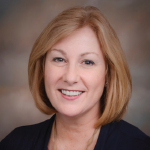PHILADELPHIA—When she saw vaping taking hold at a middle school, heightening the risk of turning children into smokers as well as boosting the risk of rheumatic disease, Kamala Nola, PharmD, MS, went to work. Dr. Nola, associate dean of academic affairs at Lipscomb University, Nashville, called the Tennessee Pharmacists Association to express her concern.
“This is not good,” she told the association. Soon, she was speaking at a press conference on the topic alongside state legislators, who wanted to introduce legislative language on tobacco use, vaping and related comorbid conditions.
“I went in and talked not just as a health professional, but as a mom and someone who cares for patients,” said Dr. Nola, recalling the occasion in a Distinguished Lecture at ACR Convergence 2022. “That passion came through, and it plays a role.”
In her talk, Dr. Nola emphasized that healthcare professionals should “play to your strengths” and speak out and take action on topics they feel strongly about. And she asked the audience to reconsider the concept of advocacy: It’s not just overt government-related activity, she stressed, but everyday actions as well.
“We bring the role of an advocate with lots of differing strengths that we have,” she said. “It doesn’t have to be just a communicator, just a learner, an analytic person or an interconnector. Whatever those strengths are, they are all related to advocacy.
“The way we give drug information, the way we give instructions when they’re discharged from the hospital after knee replacement—those are advocacy pieces,” she said.
Fueling Advocacy with Collegiality
The culture of the medical field can act as a kind of advocacy fuel, she suggested. Attending the American Juvenile Arthritis Organization meeting in 1998 was a seminal moment for her, leading to lifelong relationships with mentors and others interested in advocacy.
“That conference changed my life,” she said. “As a result of that meeting, my husband and I made a decision as a family that we would always commit to working with those who have arthritis.”
Attending conferences still feeds into her advocacy mentality, she said.
“When I come to this meeting and when I go my Tennessee Pharmacists Association meetings or my national pharmacy meetings, I get revved, I get excited, because I’m with like-minded people,” she said. “Why is that? Part of it has to do with culture. We are here for a common reason.”
Advocacy can be as simple as wearing something that can spark interest in a topic, she said, such as the lapel pin of a fork with bent tines that represents the ACR’s Simple Tasks campaign. It sends the message that even simple tasks can become impossible because of rheumatic diseases.
“This is probably the number-one conversation-starter I have with my students, with my colleagues, with patients, with my congressional delegation, my state officials,” she said. “People want to know why you’re wearing a fork. It is an open door. And that’s what we want to see, so we can have our voice heard.”
Making Advocacy Effective
The idea of advocacy might be more fundamental to the job of practicing medicine than you realize, she suggested. The official policies and mission statements of medical organizations frequently mention it. “The graduate is able to represent the patient’s best interest,” reads language used by the Accreditation Council for Pharmacy Education Standards. Language used by the Commission on Collegiate Nursing Education includes, “Baccalaureate generalist nurses are members of the profession and in this role are advocates for the patient and the profession.”
Dr. Nola outlined five rules for making advocacy encounters effective:
- Advocacy just means speaking up.
- Learn to think in terms of 51%—in other words, a small amount can make an important difference. “I always like the thought process of, ‘If I don’t say anything, I’m at zero and the status quo will remain. But if I say something, there’s potential.’ That’s what speaking up is all about,” she said.
- Always keep in mind patients as well as three other audiences: elected officials and their staff, other voters and the media. “We’ve got to think about, who else can we bring along with us in those discussions?” she said, adding, “What’s your passion? Is it JIA? Is it scleroderma? … Be that person with the media.”
- Be sure your audiences hear you.
- Always keep the door open for next time.
Teaching patients to be their own advocate will also help with their care. “How do we help our patients become their own best advocates?” she said. “We talk about shared decision making. How are they going to do shared decision making if they can’t be a self-advocate?”
Many members of the audience were probably practicing advocacy at ACR Convergence 2022 without even realizing it, she noted.
“When you present a poster, when you present an abstract, when you’re up here on stage, you are being an advocate,” she said. “One of the key takeaways from today is, it’s not always about going to Congress. There are other ways you can do this,” she said. “We’re not going to be here forever. We have to do that pay-it-forward piece.”
Thomas Collins is a freelance medical writer based in Florida.

